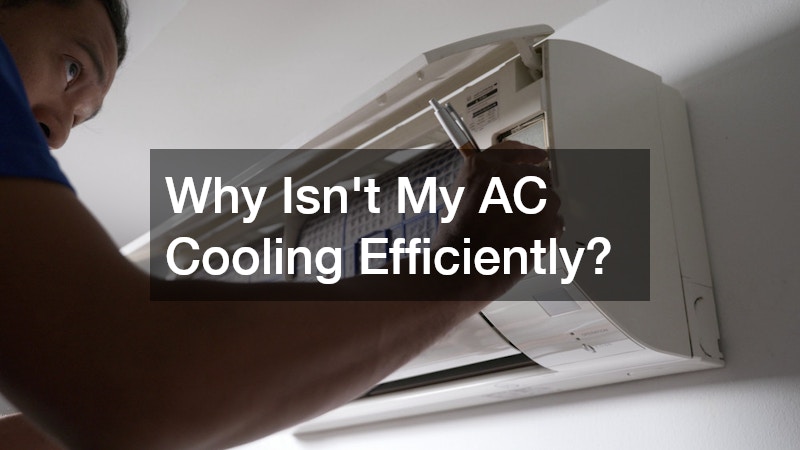
3 Signs You Should Cal an HVAC Contractor For Your AC
Air conditioning units are essential for maintaining comfort in our homes, especially during hot seasons. Proper maintenance of an AC system is crucial for ensuring its efficiency and longevity. Understanding when to call a professional HVAC contractor can save you time, money, and potentially costly repairs in the future. Many homeowners believe they can handle most AC issues themselves, which often leads to temporary fixes rather than long-term solutions. It’s vital to recognize when a problem requires professional intervention to prevent exacerbating the issue. Professional HVAC contractors possess the experience and tools necessary to diagnose and fix problems effectively. By enlisting the help of a professional, you can ensure that your AC unit operates at peak performance, ultimately saving on energy costs and extending its lifespan. This article will explore three common signs indicating it’s time to call in an expert. We will delve into the details of strange noises, inefficient cooling, and increased energy bills. Strange noises from your AC could signal an array of problems that require attention. Loose components such as screws or panels may vibrate, leading to rattling sounds. Debris caught in the fan blades can cause a loud buzzing or humming noise. Mechanical failures, such as a failing motor or compressor, could be the culprit behind more alarming sounds. A squealing noise may point to belt issues or bearings in need of lubrication. Addressing these symptoms promptly can prevent larger, more expensive repairs in the long run. Ignoring these signs can lead to severe damage to your AC system. Consequently, the longer you wait, the more considerable the repairs. Therefore, identifying the exact noise and its source is paramount for effective problem resolution. To diagnose the noise, begin by determining where the sound is coming from. Listen closely near the indoor and outdoor units during operation to isolate the source. Different noises can indicate specific issues, such as hissing suggesting a refrigerant leak and clanking indicating a loose component. Document the sounds your AC makes and describe them to a professional once you decide to contact one. This documentation can speed up the diagnostic process and ensure an accurate repair. Remember, not all noises mean your AC is failing, but neglecting them can lead to larger problems. Conducting a visual inspection may reveal visible issues, like detached parts or foreign objects. However, only a professional can truly assess and rectify the problem safely. It’s essential to weigh the risk of potential damage against the cost of professional help. If a noise is persistent or worsening, calling a professional HVAC contractor is advisable. DIY solutions might provide temporary relief but are unlikely to address underlying issues entirely. For sounds linked to critical components, professional expertise is paramount for proper repair. When your AC isn’t cooling efficiently, there are multiple potential causes to consider. Refrigerant leaks can significantly reduce cooling capacity and cause the unit to work harder than necessary. Compressor malfunctions can also lead to inadequate cooling since the compressor is integral to the cooling cycle. Dirty coils, either on the condenser or the evaporator, can obstruct heat exchange processes. These obstructions force the AC unit to operate over extended periods, reducing efficiency. Routine inspections can catch these issues before they evolve into more significant problems. Moreover, airflow issues, such as blocked ducts or a faulty blower, can compromise cooling efficiency. These issues increase wear and tear on the AC system. Addressing these elements will result in better energy use and prolonged equipment lifespan. If you notice a spike in energy bills without a change in use, conducting a basic energy audit is advisable. Reviewing monthly consumption can help identify irregular patterns or significant usage increases. Attention should be given to equipment operation hours and any potential external influences, such as seasonal changes. During an audit, check for inefficiencies throughout the home, such as poor insulation or air leaks around doors and windows. These factors can force your AC system to overcompensate, consuming more energy than necessary. Identifying these issues helps in making informed decisions about necessary home improvements and repairs. However, energy bill analysis alone might not reveal the root cause of increased consumption. Consulting an HVAC contractor can provide a more comprehensive assessment. Professionals can identify internal system faults that may contribute to high energy bills. Maintaining a close watch on AC performance and energy consumption allows for timely and necessary adjustments. By understanding these common issues and their solutions, homeowners can maintain their AC systems in optimal condition. Remember, professional HVAC contractors are your allies in maintaining a comfortable, energy-efficient home.Why is My AC Making Strange Noises?
Common Causes of Strange Noises
How to Diagnose the Noise Issue
When to Call a Professional
Why Isn’t My AC Cooling Efficiently?
Potential System Issues
Why Have My Energy Bills Increased?
Perform an Energy Audit
.
